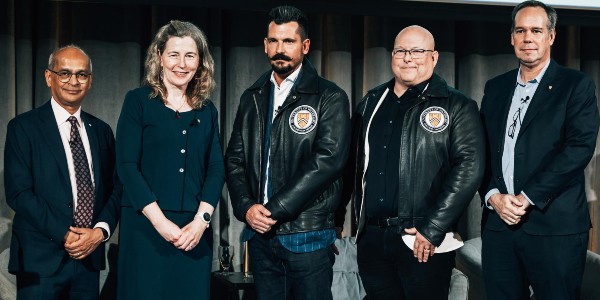As Canada struggles through a housing affordability crisis, a new institute at the University of Waterloo is attempting to find innovative solutions that can help solve some of the most pressing issues plaguing the housing industry.
This past spring, the university and Ontario land development and homebuilding company The Caivan Group launched The Future Cities Institute (FCI), an interdisciplinary hub housed within Waterloo’s Faculty of Environment. Caivan committed $10 million to the feat. Its CEOs and Co-Founders, Frank Cairo and Troy van Haastrecht, are both alumni.
The institute aims to tackle the systemic drivers of housing-related affordability and innovate across sectors, such as the design and construction of residential dwellings. Research gleaned from various faculties will also inform evidence-based decisions for city building and urban policy.
An initial focus area involves developing growth management tools that enrich decision-making among governments and industry members. Data-supported toolkits could allow policy makers and developers to visualize potential scenarios and target outcomes with the assistance of technology, like generative design tools. While Ontario is the primary location target, the aim is to export solutions across Canada and globally.
“One of the big technological synergies we’re hoping to really tap into relates to big data and AI modeling,” says Cairo. “For example, envision a municipality having access to a tool, which will allow a full examination of housing potential within a region.”
This might look like dashboards that help municipalities quickly understand the expected dwelling units over the next two to three years in an application pipeline, the state of affordability in an existing municipal region, how prices rise and fall based on the pipeline of new inventory, and potential incentives or targets municipalities should focus on to ensure the housing stock represents what is best for a region’s overall prosperity; for instance, access to housing and attracting new employers.
“A lot of the tools needed to make better decisions about housing and land inventory and planning policy really aren’t there,” he says. “We hope, as an institute, to help develop a better tool kit to assist in the process and hopefully improve affordability across the country.”
By 2030, more than half—one million of 1.9 million—new households will not be able to buy a home, according to a spring RBC Economics report, “The Great Rebuild.” Only 45 per cent will have enough income to afford a condo and a smaller 26 per cent will be able to buy a single-detached home at today’s prices and interest rates.
Coupled with that is an ongoing drought of skilled labour. Earlier this year, BuildForce Canada also found a recruiting gap of more than 85,000 construction workers by 2033. There is a productivity shortfall, Cairo observes, even if land supply and approval entitlements were no longer constraints.
“Undoubtedly, supply is the biggest thing to tackle, but if we shift gears into other realms, I would say scale is a huge area of focus,” he notes. “How do we scale up supply chains and the horsepower needed to build more, harnessing things like advanced manufacturing, robotics, immigration policy, training sessions, and a greater focus in schools around skilled trades? There is a multi-faceted requirement needed to really get productive at building things again.”
These are just a few areas the FCI will delve into while finding real-world solutions alongside STEM expertise the university is lauded for.
“There are these wonderful partnerships we’re building now between a variety of faculties where experts who have never worked in urban challenges are now turning their focus and research efforts from other technical fields into solutions related to housing, environmental sustainability, and social injustice,” says Cairo. “These are areas where, typically, you didn’t have STEM connections.”
Earlier this year, FCI director Leia Minaker commended the partnership. She is also an associate professor in the School of Planning. “Future Cities will explore the trends, innovations, and technological disruptions to help us craft policies and practices that better anticipate change,” she said.
“To do that, academics and planners need to work directly with the people and companies who are on the ground day-to-day building cities, developing new technology, and making consequential decisions.”

At the launch, from left to right: Vivek Goel, University of Waterloo President; Mary Wells, Dean of Engineering; Frank Cairo, Caivan Co-Founder and CEO; Troy van Haastrecht, Caivan Co-Founder and CEO; Bruce Frayne, Dean of Faculty of Environment.
The institute was born from the school’s Future Cities Initiative that was launched in 2022.
The initiative includes specialized training and learning opportunities through undergraduate and graduate education.
“We hope that the partnership with the University of Waterloo and the Future Cities Institute is really just the beginning of many partnerships,” says Cairo.
“One of the things we are very hopeful for is finding partners across a variety of sectors to engage with the institute, so we can bring the horsepower and expertise of academics across a variety of faculties into a room with the industry frontline to really target a new generation of solutions.”





